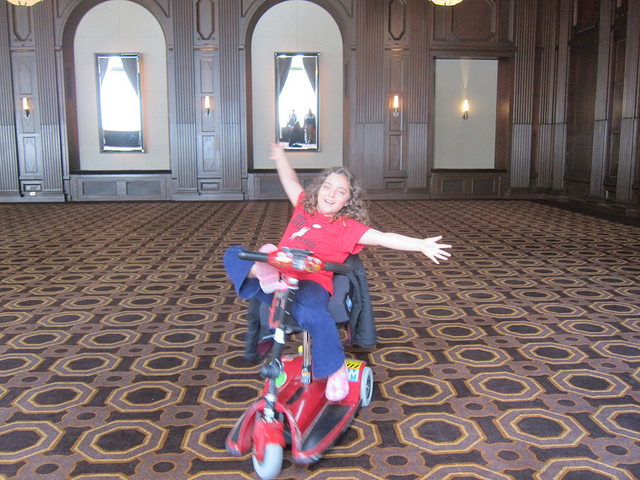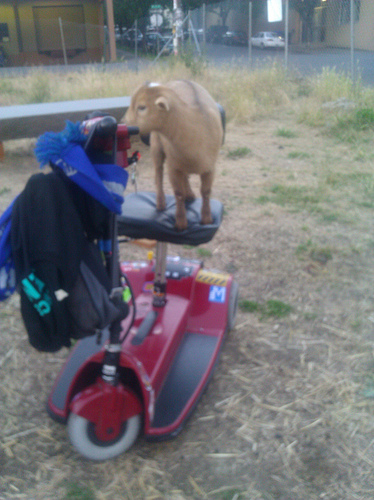Yesterday at work I joined some guys to go from the 7th floor to the first floor to find the community room. None of us had been there yet, as it is a new space for Mozilla. We looked around the corner to see some stairs. There were a couple of guys working at reception in the building lobby who came over to talk with us. Here is where the experience got unusual!
One of the guys with me, co-workers I’m not sure I even know, said to the building staff, “Hi, looks like we can’t get in this way. Can you give us directions for how to get into the first floor space?”
I nearly died of shock. The usual thing here is that a group of people I am with blithely go down or up the stairs leaving me alone to work it out, and maybe I show up 15 minutes later. Or at best the temporarily-abled folks look confused and someone tries to figure out if someone should stay with me or if that would be an insult to my independent living skills.
How nice it was to just be part of “we”. Some of us could have got in that way, down the stairs! Usually “we” go down the stairs while one of us worried about how “she” will be able to do it. Yesterday it wasn’t “we” and “her”. It was just us! No one made a big deal of it! No one fussed or acted like I was embarrassing or in the way! My grinch-like heart grew three sizes, y’all. Or, maybe… one small layer of armor could come off, and be set aside, for that day.
We all went out of the building into the rain, around the corner, through two badged entrances and a set of fire doors and a ramp, to go to the All Hands meeting.
If only that weren’t so rare of an experience.
Last week I arrived at Open Source Bridge to find the floor marked out with blue painters’ tape “travel lanes”. It was a shock. Someone had thought about it. Someone had been at AdaCamp, or at WisCon, or had done some research, and put a useful accessibility tool in place. I didn’t have to ask for it, it was just there. A surge of feeling welcome came over me, as it did at AdaCamp. I was involved in planning AdaCamp in any case so I knew the access would have some effort put into it. Open Source Bridge thought about it without asking me to organize it. What a beautiful surprise.
The travel lanes and other things like good signs about what was where, meant that I could move around the space, and it was easier for me to participate, talk with other people. It benefited many other people, not just me. It made the space more usable for everyone. Though, I have to hold in my beliefs that improved access for ONE person is enough. To keep asking and going out, I have to belief that I am enough; I deserve it. Other people’s work welcomes and includes us. This last 2 weeks, that belief solidified and expanded inside me. I don’t just deserve to ask and fight. I deserve to be welcome. We all do…
Usually, and I’m talking about 20 years here, my experience is that I ask for a specific thing that would make my participation easier whether it is independent or respectfully interdependent. Like at my hotel in Portland where I asked for the key to the lift to get into the building, to be kept in the lift and turned on. I ask for something reasonable. Then get a reply that it is impossible, inconvenient, forbidden, risky, against the law, against their policy, and so on. I might break the lift. Someone else might steal the key. Someone else will USE the lift who should not; people with luggage, kids playing, people who are just lazy and can “obviously” walk. I might hurt myself by operating the lift. Why do I think I am so special to get this exception? Why is this uppity cripple in my face? It’s just a key! Someone will always be there to operate the lift for you (they weren’t. at all. and never are.) Keep in mind this is a lift like any other one a disabled person might encounter and they are designed to be operable by people with disabilities. Anyway, I did persuade the hotel people to give me a loaner key for a $25 deposit. More on this later. But the fight I had to have to do it, and the level of assertion, armoring, fighting, repetition, knowing I was annoying people who were just trying to do their jobs, was very wearing. (It is important to me to be persistent, to ask, and to ask respectfully, until and unless it is necessary or strategic to escalate.)
In contrast to that thorny knot of fierceness and anger, here is how good allies like my co-workers at Mozilla, all the attendees and organizers at AdaCamp, and everyone at Open Source Bridge helped me feel as a participant in a shared space:

This good story happens more often for me lately, and I think back on when I first started using a wheelchair around 1993 or 1994. The attitudes were so much worse. It was rare to find anyone who understood even square one of what things were like, and disability rights, and non-medical models of impairment and disability, access and mobility. I had a magazine called Independent Living that was not very good but was still helpful and like a beacon in a storm. Then I had the great good luck to get into contact with the Disabled Students Union of DeAnza College where there were seasoned cripfam warriors. Now…. these days… it blows my mind. People major in Disability Studies. People who aren’t disabled. They think about it! They have maybe taken a class or read a book. There are multiple awesome textbooks of disability history! Grounding in history is amazing. It bears fruit. Imagine that, education helps!
It’s really heartening.
I may be muttering “fuckin’ walkies” under my breath less often while I put on my patient face and smile. What a relief.
In celebration of allies, here is another photo of a kid on my scooter. A goat kid!

Great kids x 2!
Did you have to — in the spirit of interdependence — help the goat kid up on the seat?
It’s thrilling when being disabled in a place means the same thing as being nondisabled: no hassle, no fights, no explanaaaaaations. Only as visible as we wanna be.
The goat kid needed no help and was mountaineering on my shoulders as well! And eating my hair. I now understand some of the possible cultural roots of asymmetrical haircuts.
yay!
for most of my life i have been a biped.
when i am among other bipeds who seem to be taking that condition for granted, i like to use language that assumes accessibility for all is not a swell thing we bipeds do out of our beautiful generous souls, but something we all strive for because otherwise we’re just big privileged asshats.
So true!
I think you would have laughed at me and my scooter covered in baby goats!
Thanks for this post! I included it in a link round-up at Access-Fandom.dreamwidth.org.
Thanks for all your hard and thoughtful work on the WisCon access committee over the years!
can you explain the travel lanes a bit more?
Sure, they are lanes through big rooms and hallways, marked out with blue painters’ or masking tape (which doesn’t damage floors, carpets, or painted surfaces). The travel lanes indicate areas which should be kept clear as best as possible for all people moving through the space. So, don’t stand in a travel lane having a conversation, and don’t put your chairs or backpacks in it. As a wheelchair users and also when I use crutches to walk, it is a constant struggle to keep asking people to get out of the way, or move things for me, so that I do not get “trapped” in a spot in a room without freedom of movement to leave, go to the bathroom, talk to different people, and so on. My chair or my crutches become less awkward, less likely to be seen as “taking up too much space” or being an inconvenience by able bodied people. If you try the travel lanes in a crowded hallway where people congregate as well as move, it works well to help general traffic flow. Travel lanes help maintain wide aisles in audience/auditorium chair setups, too, so people don’t sit there or park their things there. The travel lanes through a large room can lead to logical parking spots at the edges of lanes for wheelchairs and to blue tape marked chairs for people who need them. Do I even need to say this part — sadly yes — tape down cords or route them so they don’t go thru a travel lane. Does that help? Try it and see how it works next event you arrange! Explaining how to use the lanes to all at an event opening, *and* putting up an informational sign or two (in the bathrooms works) is helpful.
that is great, thanks! I just spotted them in another blog post from the event http://benjaminkerensa.com/2013/06/27/firefox-os-at-open-source-bridge they seem like a great idea, cheap, convenient and making a difference, I like that kind of thing.
this makes me feel so warm and fuzzy inside for so many reasons! I’ve just started to use a wheelchair for outings because of my Lupus, and even just you and what you do makes me still have hope for my future :3 thanks for ROCKING and being totally awesome!
Jenny, hello! You might like this http://leavingevidence.wordpress.com/2011/05/05/access-intimacy-the-missing-link/ Pretty cool stuff! When I came back to being a wheelchair rider after a few years of walking I really liked having lots of blogs to read by other people with disabilities! There are so many great writers…